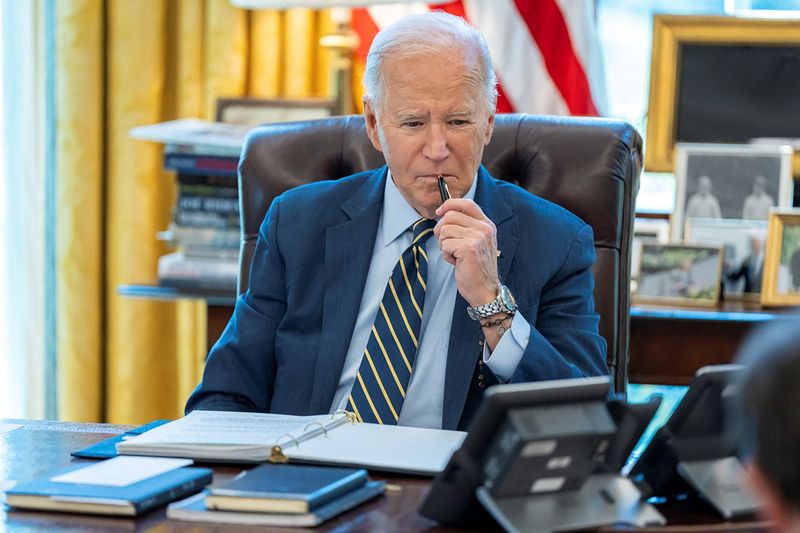A growing number of Democratic lawmakers are urging President Joe Biden to withdraw from the 2024 presidential race, believing a younger candidate may be better suited to meet the challenges ahead.
Calls for Biden’s withdrawal grew louder following Biden’s solo press conference after the NATO summit, with at least three additional Democrats in the House of Representatives expressing concerns.
Despite Biden’s team’s optimism about his performance, doubts remain within the party. Many worry whether Biden still has the strength needed to defeat former President Donald Trump and effectively lead the nation for another term.
Statements of concern
Congressman Jim Himes recognized Biden as a remarkable leader, but emphasized the importance of presenting a strong candidate for the upcoming elections.
“The 2024 election will determine the future of American democracy, and we must put forward the strongest possible candidate to meet the threat posed by Trump’s promised MAGA authoritarianism,” Himes said.
He expressed his belief that Biden is no longer that candidate and urged him to step aside.
Rep. Scott Peters (D.Calif) echoed these sentiments, pointing to Biden’s debate performance and declining swing state polls. “Today I am asking President Biden to withdraw from the presidential campaign. The stakes are high and we are on a losing path,” Peters said.
At the same time, Rep. Eric Sorensen (D-Ill), who is up for re-election in a competitive district, also called on Biden to step aside. He expressed hope for a candidate who could convey a positive vision for the country, and urged Biden to put the country’s interests ahead of personal ambition.
Biden’s response and party tensions
During the news conference, Biden reiterated his commitment to completing the job he was elected to do. He pointed out the seriousness of the situation he inherited in terms of the economy, foreign policy and domestic divisions. However, this did little to reassure his critics.
Some Democratic officials have criticized Biden’s lack of a forward-looking message and his focus on foreign policy issues that are not relevant to voters. “He has done nothing to reassure Democrats that he understands how dire his political situation is or that he has a realistic plan to win,” an official told CNBC anonymously.
As the presidential nominating conventions approach, time is running out for the Democratic Party to resolve its internal conflicts. Democratic leaders are emphasizing the urgency, believing the following week, when lawmakers return, will be the final make-or-break moment.
It is fair to say that the first significant call for Biden to withdraw came from Representative Lloyd Doggett, a longtime congressman from Texas, just five days after the June 27 debate. Doggett praised Biden’s achievements but expressed concern about his ability to defend them effectively.
A chorus of dissent
Several other House Democrats have joined the chorus, including Rep. Raul Grijalva (D-Ariz), Rep. Seth Moulton (D-Mass), Rep. Angie Craig (D-Minn) and Rep. Adam Smith (D-Wash). others.
Grijalva described the campaign as “precarious” and called on Biden to take responsibility for holding onto the White House, while Moulton, a former presidential candidate, expressed doubts about Biden’s ability to defeat Trump.
Craig, on the other hand, expressed concerns about Biden’s performance in the debate and warned of a tight window to choose a replacement, while Smith doubted Biden’s ability to effectively convey his case to the American people.
Other prominent Democrats such as Rep. Mikie Sherrill, Rep. Pat Ryan and Rep. Earl Blumenauer have also urged Biden to step aside, emphasizing the high stakes and the need to protect democracy.
Blunders and health problems
Biden’s recent blunders, including confusing Vice President Kamala Harris with Donald Trump and confusing Ukrainian President Volodymyr Zelensky with Russian President Vladimir Putin, have fueled criticism and raised questions about his age and clarity.
These mistakes have been widely ridiculed online and used by Republicans to undermine his campaign.
Health issues have also been a concern. Biden’s personal physician, Kevin O’Connor, recently addressed the allegations of Parkinson’s disease after a lackluster debate performance.
Additionally, New York-based neurologist Dr. Tom Pitts that Biden is exhibiting “classic hallmarks of neurodegeneration” based on his public appearances.
While some prominent Democrats have refrained from taking a definitive position, others have expressed doubts. Senate Majority Leader Chuck Schumer has publicly supported Biden but has privately indicated he is open to a replacement. Former Speaker of the House of Representatives Nancy Pelosi and current Democratic Speaker of the House of Representatives Hakeem Jeffries have remained non-committal.
Despite growing opposition, Biden still has steadfast supporters. Vice President Kamala Harris and potential replacement candidates such as California Governor Gavin Newsom, Michigan Governor Gretchen Whitmer and Maryland Governor Wes Moore have endorsed him. The Congressional Black Caucus and the Congressional Hispanic Caucus have also affirmed their support.
As the Democratic Party faces its internal struggles and pressure mounts on Biden to step aside, the coming weeks will be crucial in determining the party’s strategy for the 2024 elections. Now more on the stakes are higher than ever, Democrats will want to present a united front capable of securing victory.


